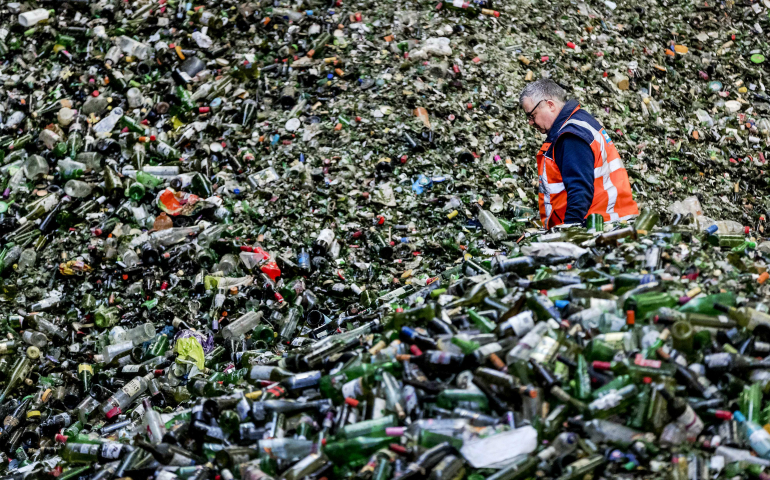
Bottles consumed during Christmas and New Year's celebrations await recycling in Gameren, Netherlands, Jan. 3. (CNS photo/Remko De Wall, EPA)
When exclamatory news alerts like this one appear in our inbox, most of us want out of the box:
BREAKING NEWS ALERT (Boston Globe, Jan. 18, 2017)
Marking another milestone for a changing planet, scientists reported on Wednesday that the Earth reached its highest temperature on record in 2016 — trouncing a record set only a year earlier, which beat one set in 2014. It is the first time in the modern era of global warming data that temperatures have blown past the previous record three years in a row.
We in the realm of environmental concern often have a simultaneous sense of needing to do more while knowing we also need to do less. We have used the slogan "Less is More" for so long that we are aware of the limits on growth. We know we are stumbling toward sustainability and want to walk confidently toward it.
Fortunately, our yearning for less becoming more in our own behavior, has spawned a small industry of continuing ecological education. Here, I name a few of the organizations that are helping activists sustain ourselves along this journey toward sustainability.
- The Windcall Institute supports visionary organizing in communities of color and engages participants in open discussions on transformative practices for staying power. Topics it discusses include: "How to create space rather than time," "Building habits of resilience," "Clearing vicarious trauma" and "Mindful breath/mindful justice." Windcall's Staying Power program works at the intersection of a multitude of issues. If climate is yours, you will be helped to become more resilient — and less afraid of headlines — by working with the wind's call.
- Etsy.com's Good Work Institute encourages spiritual and sustainable entrepreneurship where participants learn not just to do less harm but also to do genuine good. The third cohort of spiritual entrepreneurs, involving both for-profit and not-for-profit businesses, has just begun in the Hudson Valley of New York State. Etsy.org is a child of Etsy.com, and its first offspring is the Good Work Institute, which creates a community about and around people in start-up businesses who learn how to manage success in socially profitable as well as personally profitable ways.
- Yale University's first Graduate Conference in Religion & Ecology, hosted by a collaboration of different campus organizations, will take place April 21. The theme is "Ethos, Ethics and the Environment" and invites participants (it is free to the public) to consider this question: "How do beliefs about the environment affect the use of and engagement with the natural world?"
- SheEO is a new business model launched in 2015 that seeks to radically transform how we support, finance and celebrate female entrepreneurs who are creating a better world. Their goal is to recruit 1,000 generous women "Activators" per region to each commit to making a $1,000 contribution, of which 90 percent is loaned out interest-free to local women-led ventures, paid back over five years, and reinvested perpetually. Their goal for 2020? One million women in 1,000 cities making loans to 10,000 female entrepreneurs — a billion dollars of capital.
- The justice ministry education program at Auburn Theological Seminary, in New York, is a clinical pastoral program, not just for clergy but also for community organizers and others who want to dip their toes into advanced education for the 21st century.
Finally, plain old action-reflection can be very effective. You don't have to register or add to your carbon footprint by going somewhere. You don't have to apply for a scholarship or pay tuition. Instead, you start where you are and do what you have been doing and add a dimension of reflection to it. For every hour you work, you also reflect. For every action you do, you add an analysis of it. For every plan you make, you evaluate your achievements, intentionally, at a later date, so that you can decide whether you want to do the same thing again.
Many people say we need to think as much as we act, hour for hour, day for day. I don't know if any of us can afford more learning, even though we may all need it. I do know all of us need to reflect deeply on what we should be doing next and ongoing. Some of us will need formal programs. Others will know how to do it yourself — and create communities of reflection inside their own practices. Either way, as we stumble along, we need to learn and re-learn how to stay balanced.
I'd like to put in a good word for that word "stumble." My friend who now spends her days in a wheelchair says that her rehab is learning how to walk again. The main teaching, she says, is re-learning balance.
The environment that we want to protect requires that we stumble along to balance, as well. Less can become more, as we stumble along, either actively or reflectively toward more impact and calm. Action reflection is a method not just for more impact and not just for more calm, but each acting and reflecting together as part of the same motion.
In acting and reflecting, we experience the way less can become more.
[Donna Schaper is senior minister of Judson Memorial Church in New York City.]
Editor's note: Want more stories from Eco Catholic? We can send you an email alert once a week with the latest. Just go to this page and follow directions: Email alert sign-up.


